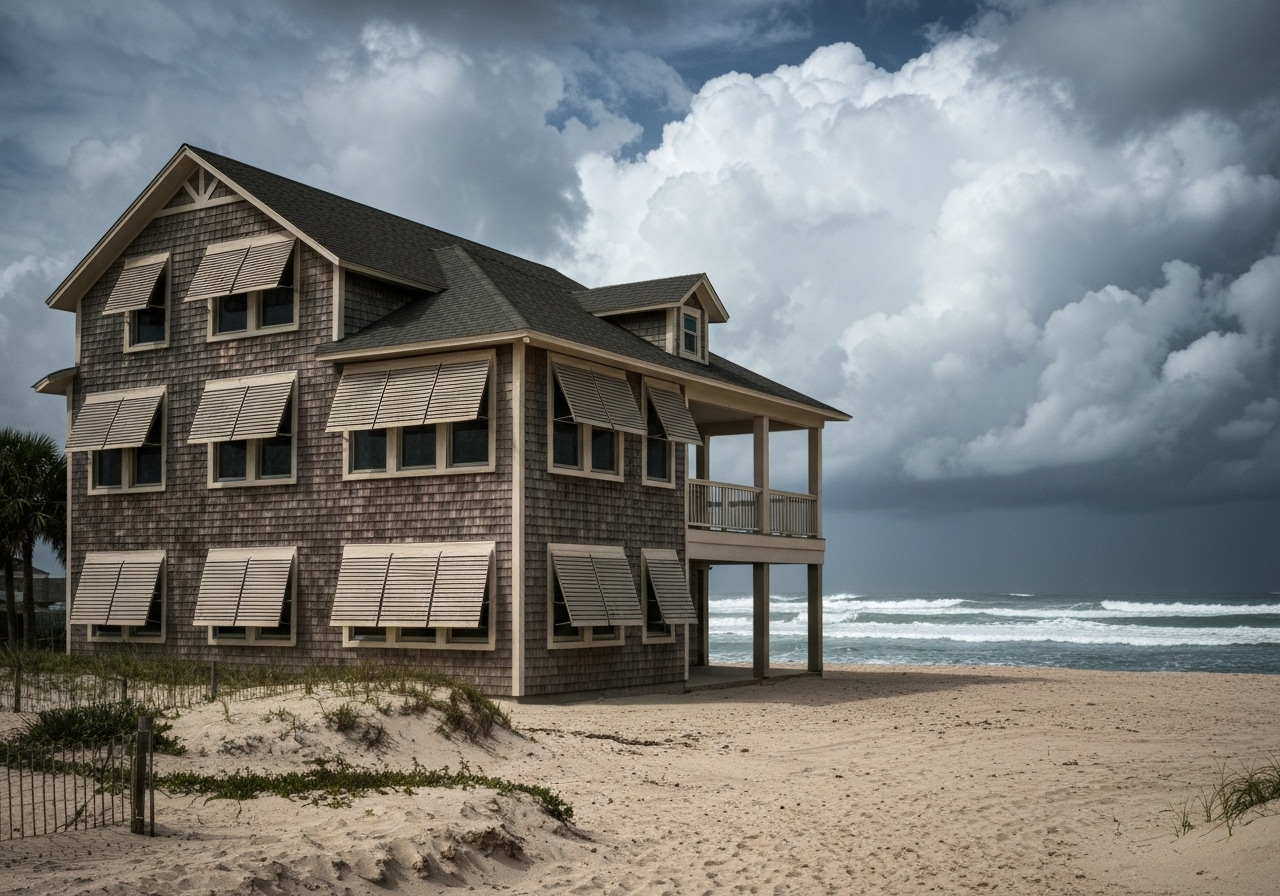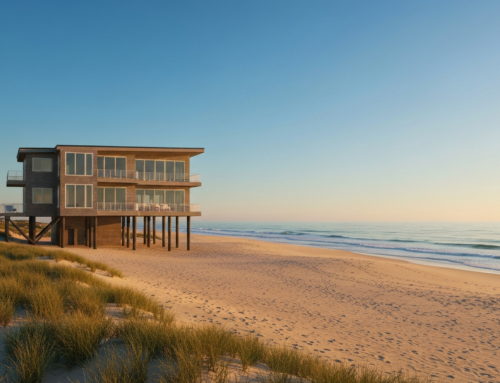Introduction: Safeguarding Your Coastal Home Against Hurricanes
Living in coastal regions offers unparalleled beauty and unique advantages, but it also comes with the significant responsibility of preparing for natural disasters. For homeowners in these vulnerable areas, effective Hurricane Preparedness is not merely a suggestion but a critical necessity. Hurricanes are powerful and destructive weather events, bringing with them a trifecta of dangers: storm surge, fierce winds, and torrential rainfall, all of which can lead to extensive property damage and pose severe risks to life.
Understanding Coastal Home Risks and Why Insurance Matters
Coastal properties face elevated risks due to their proximity to the ocean. The primary hazards associated with hurricanes include:
- Storm Surge: An abnormal rise of water generated by a storm’s winds, often the most dangerous aspect of a hurricane and a leading cause of fatalities. Storm surge can travel several miles inland.
- Heavy Rainfall and Inland Flooding: Tropical cyclones frequently produce widespread, intense rains, leading to deadly and destructive floods, even far from the coast. Flash flooding can occur rapidly.
- High Winds: Hurricane-force winds (74 mph or more) can devastate structures, turning debris into dangerous projectiles. Winds can maintain hurricane strength well inland.
- Rip Currents and Tornadoes: Strong waves can generate deadly rip currents, and hurricanes can also spawn tornadoes, which, while often short-lived, still pose a significant threat.
Understanding these hazards is key to informed decision-making regarding property protection, as detailed by the National Hurricane Center. Many standard homeowners insurance policies explicitly exclude damage caused by flooding, highlighting the critical need for specialized coverage. Homeowners should consider a thorough flood risk assessment to understand their specific vulnerabilities.
Essential Home Insurance Coverages for Hurricane Preparedness
A robust home insurance policy forms the bedrock of hurricane preparedness. While standard homeowners insurance typically covers perils like fire, lightning, and hail, it’s crucial to understand its limitations, especially concerning water damage. For comprehensive protection, consider the following:
- Dwelling Coverage: This covers the physical structure of your home. It’s vital to ensure your coverage is sufficient to rebuild your home at current construction costs, not just its market value or mortgage amount. Options like guaranteed or extended replacement cost coverage can protect against increased rebuilding costs after widespread disasters. An inflation guard clause can also automatically adjust your dwelling limit.
- Personal Possessions Coverage: Most policies offer 50% to 70% of your dwelling coverage for personal belongings. It’s essential to conduct a home inventory and consider replacement cost coverage, which pays for new items, rather than actual cash value, which accounts for depreciation.
- Additional Living Expenses (Loss of Use): If your home becomes uninhabitable due to an insured disaster, this coverage pays for temporary living costs like hotel bills and restaurant meals.
- Liability Coverage: Protects you against lawsuits for bodily injury or property damage you or your family members (including pets) cause to others. Consider increasing minimum liability amounts, and for significant assets, an umbrella or excess liability policy offers broader protection.
- Flood Insurance: This is a separate policy essential for coastal homeowners, as standard homeowners insurance does not cover flood damage. The National Flood Insurance Program (NFIP) provides this crucial coverage, protecting both the building and its contents against flood-related losses.
- Ordinance or Law Endorsement: Building codes are updated periodically. If your home is significantly damaged, you might be required to rebuild to new, more expensive codes. This endorsement helps cover those additional costs.
Navigating Your Hurricane Deductible with Beach Insurance LLC
Understanding hurricane and windstorm deductibles is paramount for coastal homeowners. Unlike a standard deductible, which is typically a fixed dollar amount, these specialized deductibles are often calculated as a percentage of your home’s insured value, commonly ranging from 1% to 10%. This means a 5% deductible on a $400,000 home would result in a $20,000 out-of-pocket expense.
It’s crucial to distinguish between:
- Hurricane Deductible: Applies specifically to damage from officially designated hurricanes by the U.S. National Weather Service (NWS) or U.S. National Hurricane Center (NHC).
- Named Storm Deductible: Broader, covering damage from any weather event named by the NWS or NHC, including tropical storms and typhoons.
- Windstorm or Wind/Hail Deductible: The broadest category, covering damage from any wind or hail event, regardless of whether it’s part of a named storm.
The “trigger event” determines when these deductibles apply, varying by state and insurer. Common triggers include hurricane watches or warnings issued for an area, or sustained hurricane-force winds within a certain proximity. Florida, for example, has specific statutes regarding deductible options and mandates that the hurricane deductible applies only once per hurricane season if you remain with the same insurer. Reviewing your policy’s declarations page is essential to clarify these specifics and understand how to understand your home’s protection and financial obligations. Don’t get blindsided; understand home insurance windstorm deductibles before disaster strikes.
Beyond Coverage: Practical Steps for Effective Hurricane Preparedness
Beyond robust insurance coverage, proactive physical and logistical preparations are vital for coastal homeowners facing hurricanes. Taking these steps can significantly minimize damage and enhance safety:
- Create an Emergency Plan: Develop a detailed family emergency plan that includes designated evacuation routes, a communication strategy for staying in touch if separated (designating an out-of-town contact), and practiced safety protocols. Local governments often provide specific evacuation maps and real-time updates.
- Assemble an Emergency Kit: Prepare a comprehensive kit with essential supplies for at least three days. This should include non-perishable food, one gallon of water per person per day, first-aid supplies, prescription medications, flashlights, batteries, a portable phone charger, cash, and important documents (insurance policies, IDs). Regularly review and update the kit.
- Secure Your Property: Take proactive measures to fortify your home against high winds and water.
- Install storm shutters or use 5/8-inch plywood to protect windows and glass doors.
- Reinforce doors and roofs with additional fasteners and braces.
- Trim trees and clear your yard of loose items that could become dangerous projectiles.
- Ensure gutters and drains are clear to prevent water backup and damage.
Additional tips for maintaining your property and preventing costly damage can be found in our guide on homeowner maintenance tips. The Florida Division of Emergency Management also provides comprehensive planning resources for homeowners.
- Stay Informed: Monitor weather updates from reliable sources like local news, radio, and NOAA Weather Radio. Sign up for emergency alerts from local government agencies. The National Weather Service offers detailed information on what to do before a tropical storm or hurricane.
After the Storm: Steps for Filing a Home Insurance Claim
Once a hurricane has passed and authorities declare it safe to return, the recovery process begins. Navigating an insurance claim efficiently is crucial for a smooth recovery:
- Prioritize Safety: Do not enter damaged areas until you are certain they are structurally sound. Watch out for downed power lines, gas leaks, and other hazards.
- Document Damage Thoroughly: Before making any repairs, take extensive photos and videos of all damaged areas of your property and belongings. This visual evidence is invaluable for your claim. Create a detailed list of all damaged items, including estimated values and any available receipts.
- Contact Your Insurance Company Promptly: Report the damage as soon as possible. Have your policy number and a clear description of the damage ready. Inquire about the next steps in the claims process.
- Mitigate Further Damage: Take reasonable steps to prevent additional damage, such as covering a damaged roof with a tarp or boarding up broken windows. Keep receipts for all expenses incurred during these mitigation efforts, as they may be reimbursable.
- Cooperate with the Adjuster: An insurance adjuster will inspect the damage. Be present during the inspection and provide all requested information and documentation. While public adjusters can be helpful in complex cases, there are reasons you might not need one, especially for straightforward claims.
- Review Your Policy: Re-familiarize yourself with your coverage limits, deductibles, and any exclusions. If you have questions, contact your insurance agent for clarification.
Partnering with Beach Insurance LLC for Comprehensive Coastal Protection
Navigating the complexities of coastal home insurance and effective Hurricane Preparedness requires expert guidance. Beach Insurance LLC specializes in assisting homeowners in understanding their unique risks and securing comprehensive coverage. We work to clarify complex policy language, explain deductible triggers, and identify potential discounts for storm mitigation, ensuring you have the right protection in place for your most valuable asset. By combining robust insurance with diligent preparedness, you can face severe weather events with greater confidence, knowing your home and finances are well-protected.






